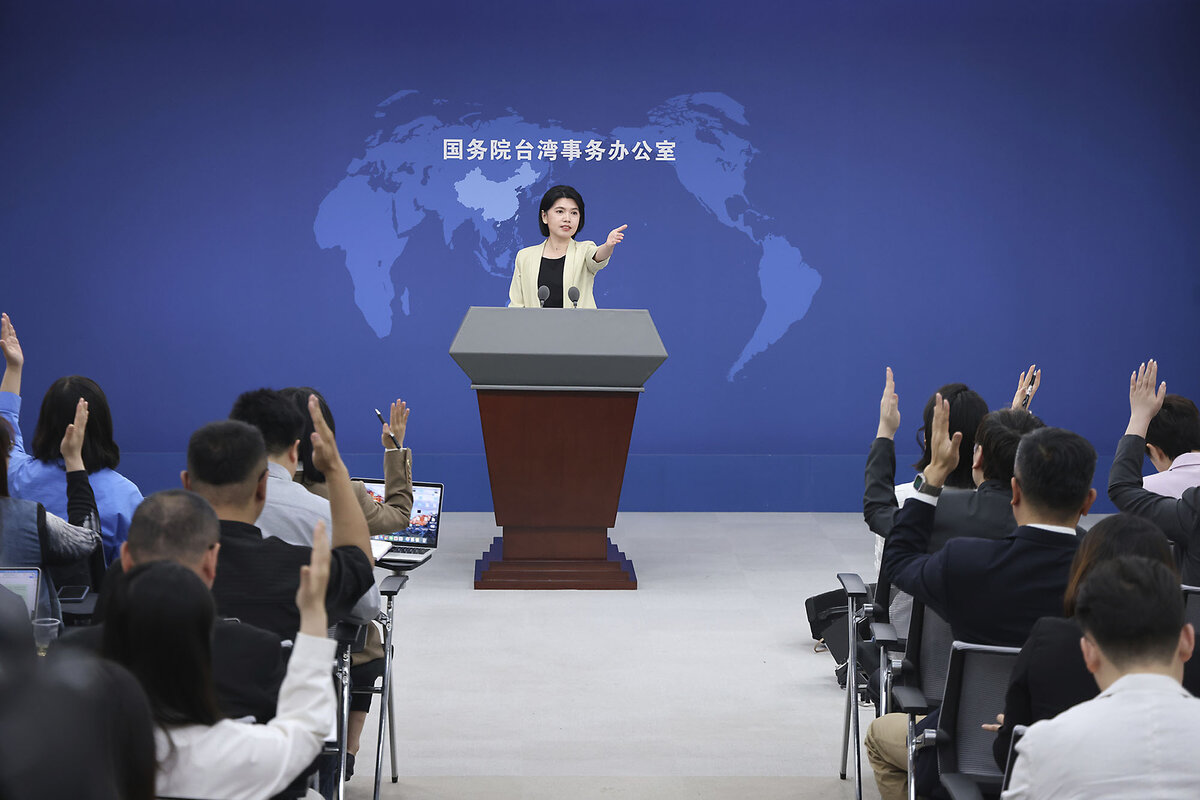Taiwanese rethink China travel as Beijing raises stakes for 'separatist' speech
Loading...
| Beijing
Until a few years ago, Summer Chen traveled often from her home in Taiwan to China, venturing across the Taiwan Strait for her job as a journalist and sightseeing with her husband. “We enjoyed the culture, history, [and] beautiful scenery,” she recalls.
No more. Ms. Chen, who founded a fact-checking organization that debunks Chinese disinformation, now shuns such trips, for fear that Beijing could label her a “Taiwan independence” supporter and arrest her.
While China’s expanding military drills around Taiwan often capture media headlines, Beijing is waging a less visible legal and psychological campaign that nonetheless feels more intimidating to many Taiwanese.
Why We Wrote This
Taiwanese are growing wary of cross-Strait travel as Beijing cracks down on what it calls 'pro-independence' activities – broadening the definition to justify harsh punishments for a wide range of political expression.
In recent years, the Chinese government has dramatically broadened its definition of what constitutes “Taiwan independence” activities. They now include any “conduct seeking to separate Taiwan from China,” and acts that deny “the reality that Taiwan is part of China,” or “suppress” support for unification. This wide net covers a vast array of political, economic, and cultural expression. Last year, Beijing also issued new punishment guidelines under China’s 2005 anti-secession law, allowing the death penalty for “Taiwan independence” activists.
These changes put younger people such as Ms. Chen – who are more likely to support Taiwan’s autonomy from Beijing – in a difficult position.
“We all feel tense … and we won’t travel on the mainland,” says Ms. Chen from Taipei. “We totally avoid changing planes in China or Hong Kong.”
Beijing shifts its red line
In the past, Beijing used a narrower definition of “Taiwan independence,” focusing on a formal declaration of independence by Taipei. China’s Communist Party-led government has never ruled Taiwan, but has claimed the island for decades and has vowed to retake it – by force, if necessary. Yet polls show that most of the 23 million people who live in Taiwan, a self-governing democracy, favor the status quo of autonomy.
With the rising popularity of Taiwan’s Democratic Progressive Party (DPP), which advocates self-determination and has ruled Taiwan since 2016, Beijing has grown more concerned about the island’s slow political drift. The DPP holds that Taiwan is de facto independent, so formally declaring independence is unnecessary.
To counter this trend, Chinese leader Xi Jinping has targeted what he calls “incremental independence” moves by Taiwan – including any efforts by individuals or groups to restrict ties with mainland China. In the past year, his government went so far as to publish a list of so-called Taiwan independence “diehards,” and set up a tip line calling on the public to report alleged “thugs” and “accomplices” who support the island’s independence.
In essence, Mr. Xi is signaling that Beijing will not tolerate continued lack of progress toward unification.
Today “anything can be interpreted as Taiwan independence,” says a Taiwan government official, who spoke on condition of anonymity because he was not authorized to grant media interviews. “That is dangerous.”
‘Avoid unnecessary travel’
China’s widening legal net has already ensnared individuals such as Taiwanese political activist Yang Chih-yuan, who was detained in 2022 and sentenced in 2024 to nine years in a mainland prison on charges of “separatism.”
In February, Taiwan-based publisher Li Yanhe was convicted of inciting separatism by a Chinese court and given a three-year prison term. Mr. Li, who was born in China but has lived in Taiwan since 2009, was detained while traveling in China in 2023.
As of May, 89 Taiwanese were missing or detained in China, according to Taiwan’s Mainland Affairs Council.
Given what it called “a serious threat to the personal safety” of Taiwanese, Taipei issued a warning last year advising citizens to “avoid unnecessary travel” to mainland China, Hong Kong, and Macao. The government also encouraged travelers to sign up in advance on a new online China travel registry to speed its response to any incidents.
Rising safety risks have contributed to a steady reduction in the number of Taiwanese working in China in recent years, a trend also driven by trade tensions, the pandemic, and the slowing Chinese economy.
Trips by Taiwan citizens to mainland China have plateaued at around 200,000 per month, well below the 2019 pre-pandemic level, and have trended downward in the past year.
Chipping away at Taiwan’s democracy
China’s legal crackdown on “separatists” from Taiwan is closely tied to Beijing’s broader campaign to compel unification, says Julia Famularo, a lecturer in Asian Studies at the University of Hawaii. “Beijing seeks to employ media warfare, legal warfare, and psychological warfare as part of a strategy to undermine Taiwan’s democracy” and encourage self-censorship, she says.
Just as China’s Coast Guard and Navy conduct large-scale exercises to simulate a military blockade of Taiwan, Beijing has also targeted Taiwan businesses linked to politicians who seek to bolster the island’s resilience, she says. Such events represent Beijing’s “coordinated efforts to … undermine and isolate Taiwan,” she says.
In March, Taiwan’s President Lai Ching-te announced 17 strategies to counter China’s threats, including raising awareness of the mounting legal and travel risks. Taiwan’s people must unite to “defend our sovereignty, uphold our free and democratic way of life, and resolutely oppose annexation of Taiwan by China,” he stressed.
Ultimately, Taiwan’s future will depend upon the resilience of its people, Dr. Lai and other officials say. “To defend our country is our own responsibility,” says Charles Liao, Director-General of the Taipei Economic and Cultural Office, Taiwan's de facto consulate, in Boston. “If we don’t show our resolve … we cannot expect anyone to help.”







